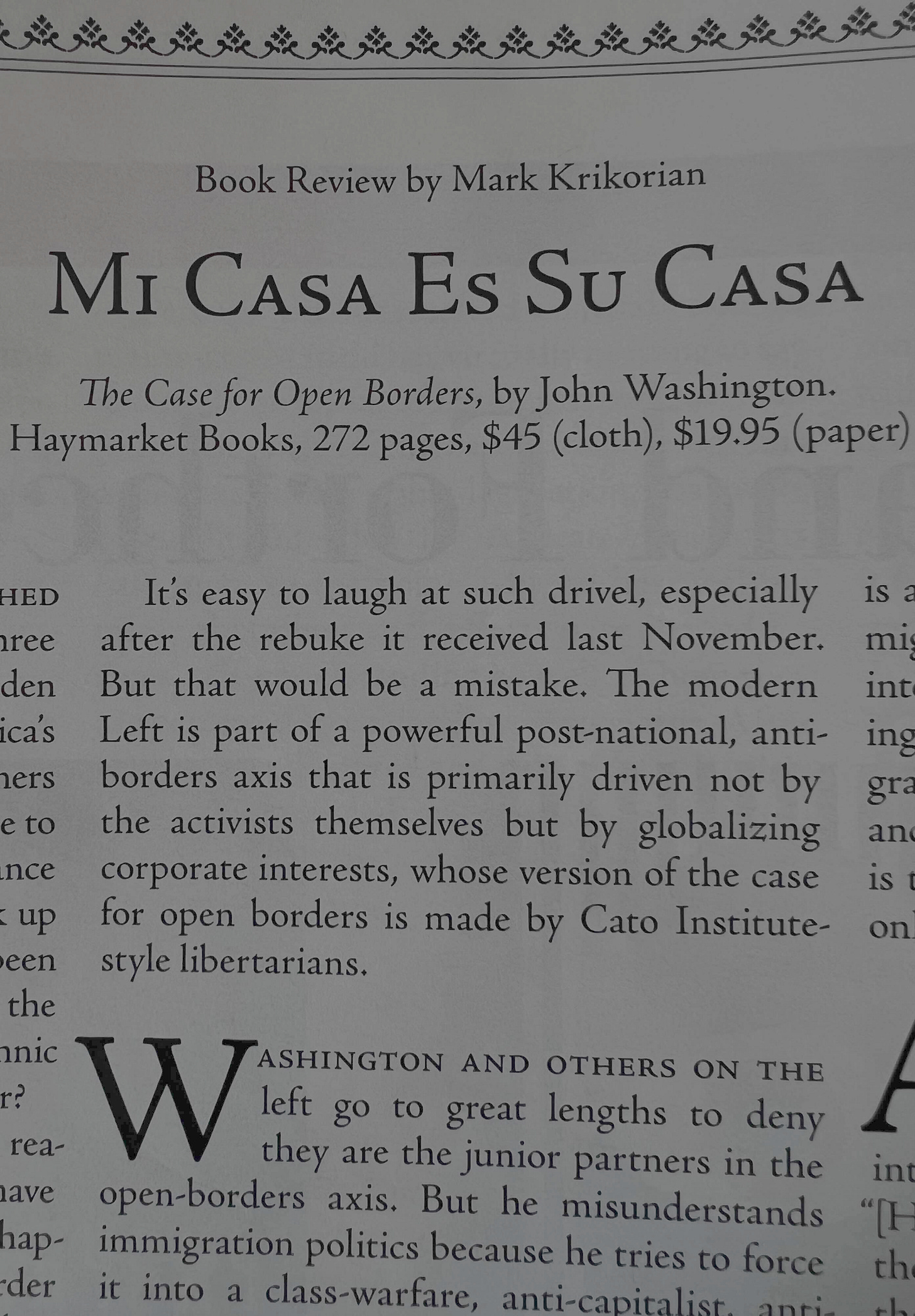case / countercase
and the exultations of argument
For his sins, as he put it in a social media post, Mark Krikorian read and reviewed my book, The Case for Open Borders.
Krikorian has been the Executive Director of the Center for Immigration Studies since 1995. CIS’s motto, “low-immigration, pro-immigrant,” misunderstands the reality and exigencies of modern immigration, especially forced-migration, a category that today includes more than 110 million people. You can’t deny someone the right to safety and dignity and credibly say you’re pro that person. Krikorian’s mental loop-de-loops thus begin…
The title of his review, appearing in Claremont Review of Books, signals the tone of the attack, taking a revered and homely idiom, mi casa es su casa, and making it out to be a defect: the equivalent of putting “Do unto others” into scare quotes.
My message to Krikorian, a version of which which I sent to the magazine, was that if the conservative right wants to untether itself from the worst suppositions of anti-immigrant malice, disassociate themselves from scenes of armored vehicles rolling down American streets or masked soldiers violently snatching up day laborers, it needs to stop scare-mongering and relying on the evidence-empty rhetoric that Krikorian and the think tank he leads have been spouting for decades. The drip-drip of scapegoating immigrants for all our society’s ills has helped set the groundwork for militant antipathy towards them, as well as the Trump admin’s flailing, lawless crackdowns. As a society, as a democracy, we need to walk back from the cliff of executive power consolidation and looming authoritarianism—and sane, humane, evidence-backed conversations about immigrants will help us do that.
Moreover, if supporters of the conservative right want to pursue sound fiscal policy, they should seek to unwrite our harshest immigration laws and let people who want or need to migrate do so. Any serious economist looking at the facts of immigration recognizes, as I lay out at great length in my book, that more immigration is a short, medium, and long term good for local and national economies.
Krikorian interprets that as a load of drivel, concluding that I’m a stooge for the corporate elite.
There’s a lot to unpack, a lot to refute. And I’m taking the time to do so not because I feel intellectually stung or think I’ll be able to change Krikorian’s mind (or soften the sclerotic brain of his “think” tank) but because I believe in scholarly repartee, and I think engagement-in-itself (even if wildly misinformed, as in the case of Krikorian) is healthy.
I’ll focus on two of his most hyperbolic and distorted claims: that the Biden administration “effectively opened America’s borders;” and that those “open borders” are the cause of migrants being “squeezed and exploited.”
The borders were opened, Krikorian says, “because the people in charge of border policy didn’t believe in the legitimacy of borders.”
Krikorian doesn’t cite evidence for that claim. That’s probably because there isn’t any, though there is plenty of evidence to the contrary. Here, for example, is Alejandro Mayorkas, Biden’s DHS Secretary, doing his typical and touting the “tough consequences for those crossing the border unlawfully” — boasting about a 15-year-high of deportations.
The decontextualized "evidence" that Krikorian gestures towards (“9 or 10 million foreigners who had no right to enter” during the Biden admin) needs context. Namely that Biden deported about 4.5 million others, and that around 5 million of those “9 or 10 million” were still legally being processed, with nearly all of them in some form of removal proceeding or only with temporary status — meaning the government was likely going to remove millions more of them.
Yearly averages of border crossings also fluctuate, with well over 1.5 million people apprehended along the US-Mexico border each year in the late 1990s, and another 1.5 million or so annually sneaking across. Does Krikorian claim we had “effectively open borders” then?
While open borders are not what we have now, and not what we had under Biden or under Clinton, going back a decade further, that was what conservative icon Ronald Reagan actually called for. Here’s the Gipper:
Talking about putting up a fence… Why don’t we work out some recognition of our mutual problems, make it possible for them to come here legally with work permit, and then, while they’re working and earning here, they pay taxes here. And when they want to go back, they can go back. And they can cross, and open the border both ways by understanding their problems.
A bit of a word salad, but a reasonable proposition.
So… did Biden open borders?
Here’s what the Biden admin did along the border:
starting in May 2023 and expanding in the summer of 2024, illegally precluded nearly 100% of all asylum claims for people who crossed the border outside a port of entry, even as they simultaneously blocked people from accessing those ports of entry (with some exceptions or extraordinary long and dangerous wait times)
increased spending on and sought to expand immigration detention
overall deported a higher percentage of border crossers than Trump did in his first term
increased expulsions to Mexico: the most people the first Trump admin expelled in a single month was just over 75,000; within his first year in office, Biden more than doubled that number, expelling more than 200,000 people in July, 2021
continued to separate immigrant families
continued to repair broken pieces of the border wall and close gaps in the wall
tried to speed up the processing and deporting immigrant families
sent 1,500 National Guard troops to the border
The litany is not in defense of the Biden administration. In my book (both literally and figuratively speaking) the above are accusations of gross misconduct that should be considered and prosecuted as human rights violations. A takeaway from that above list is not just to undercut a baseless claim from Krikorian, but to show how the Biden administration, and the Democrats and the Left more generally, gave Trump the tools plus material and ideological support for the worst of what we’re seeing today.
So if Krikorian so despised what the Biden admin did, he would despise severe border restrictions — just like proponents of open borders do. (👋) Instead, he wields the straw-man argument conservatives have been brandishing for years: hoodwinkingly claiming leadership Dems are for or have instituted open borders, and then declaiming the misrepresented status quo.
Do closed borders help or hurt migrants?
My question here isn’t arch, because even if the answer is obvious, it’s still good to ask. Krikorian either hasn’t ever spoken to a immigrant (he definitely has) or hasn’t thought through the obvious of how policies impact people. Of the many hundreds of migrants I’ve formally interviewed, the many thousands I’ve spoken with, as well as the migrants in my close family — my mother, my in-laws, as well as aunts, uncles, cousins — nearly all are unequivocally clear that closed borders threaten their basic security and freedom, make it harder to get and keep jobs, and imperil their lives.
Krikorian, and so many border restrictionists like him, thus has it, once again, bass ackwards.
While he’s right that corporations benefit from migrants remaining vulnerable and undocumented, the solution isn’t to keep trying and failing to close borders, which would just continue to shunt people into gray and black markets and leave them as targets for the exploitation Krikorian ostensibly laments. And even if, somehow, at great moral and financial expense, we were actually able to completely seal the border, what that would do is starve corporations of workers — as well as kneecap existentially critical industries and gut the national economy. The proffered “solution” here to worker exploitation is not eliminating workers altogether, but bringing workers wholly into the community, where they are documented and have all the basic, labor, and organizing rights all residents (should) have.
By ignoring the common sense solution to migrant exploitation, Krikorian embraces a similar illogic that immigration restrictionists slip into when decrying the profits gleaned by human smugglers. I’ve written about this issue previously, laying out exactly how tightened borders benefit human smugglers.
But Krikorian doesn’t lean on facts, or listen to migrants, instead he declaims, insists, mocks, and dribbles out a constant string of truly dangerous drivel.
Deliberate decentralization
I’m only 150 pages into Native Nations, by historian Kathleen Duval, but I already feel mind-reset on some really basic history. Did you know that the “Sonoran Desert was home to the largest agricultural system of twelfth-century North America”? Nor did I know the incredible turnabout many Indigenous nations made during the Little Ice Age, which began in the 13th century.
The story starts with about a millennium of centralization, when the Hohokam (or Huhugam) — as well as various other groups throughout North America — built canals, pyramids, increasingly relied on agriculture, constructed big cities, and became more hierarchical along the way. And then, after a series of droughts, floods, and the onset of the Little Ice Age, such centralization was no longer tenable and began to spike class tensions. Leaders responded by trying to further shore up their power, and common people revolted.
“What happens when dominant rulers fail in their omnipotence, when the security or prosperity they promise erodes?” Duval asks. “Throughout North America, the benefits of belonging to centralized civilizations declined, and the awe and loyalty that leaders inspired declined as well, as they proved incapable or corrupt.”
As crop yields plummeted, floods damaged canal systems, and leaders resorted to war, people decided to leave cities and restructure their political systems.
As Duval summarizes: “All across North America, the old era of hierarchy and centralization was ending. People were slowly building more sustainable ways of living that could more predictably feed and shelter people in an unpredictable climate. And they were creating more equitable ways of living together, in hopes of preventing leaders from accumulating too much power.”
Seems like a lesson worth re-learning.


